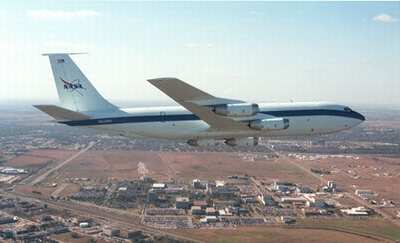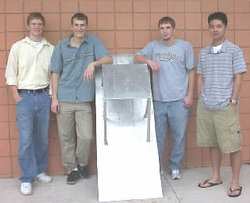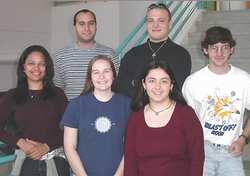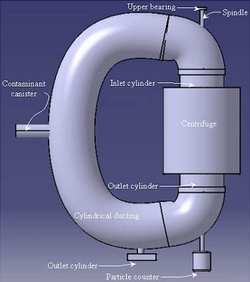 Two student teams from Embry-Riddle Aeronautical
University have been selected by NASA to conduct experiments of
their own design aboard NASA's KC-135 (otherwise known as the
"Vomit Comet"), a research aircraft that flies parabolic arcs to
simulate weightlessness.
Two student teams from Embry-Riddle Aeronautical
University have been selected by NASA to conduct experiments of
their own design aboard NASA's KC-135 (otherwise known as the
"Vomit Comet"), a research aircraft that flies parabolic arcs to
simulate weightlessness.
The first team, which will participate in NASA's Reduced Gravity
Student Flight Opportunities Program from April 24 to May 3, will
conduct research into the effect of near-zero gravity on fluid
pressure in the head. The second team, scheduled for July 10-19,
will test a device that cleans contaminants from the air in reduced
gravity without using filters.

Held annually at Ellington Field near the Lyndon B. Johnson
Space Center in Houston, the program is sponsored by NASA in an
effort to increase the number of technical professionals graduating
from U.S. colleges and universities.
A review panel of NASA scientists and engineers selected 72
student teams from across the nation to participate in this year's
program, which starts March 13 and ends Aug. 2. Most teams consist
of four undergraduate students, a supervising faculty member, and a
professional journalist who will report on the team's experiences.
The Embry-Riddle students participating in the program are pursuing
degrees in aeronautical science, aerospace engineering, and
engineering physics.
 "Learning how to function in near-zero gravity
exactly the way that the astronauts do is as good an experience as
college students can have," said Dr. John Olivero, chairman of the
Physical Sciences Dept. at Embry-Riddle and faculty supervisor of
the two teams. "We are especially proud that Embry-Riddle student
teams conceived the experiments, submitted their proposals to NASA,
built, and will operate their experiments by themselves with little
more help than a faculty advisor."
"Learning how to function in near-zero gravity
exactly the way that the astronauts do is as good an experience as
college students can have," said Dr. John Olivero, chairman of the
Physical Sciences Dept. at Embry-Riddle and faculty supervisor of
the two teams. "We are especially proud that Embry-Riddle student
teams conceived the experiments, submitted their proposals to NASA,
built, and will operate their experiments by themselves with little
more help than a faculty advisor."
The Embry-Riddle team that will fly in April consists of leader
Alexander Potter, Felix Chung, Matthew Link, Phillip Midler, and
Martin Potter. Their experiment is titled "Quantification of
Intracranial Pressure Using Pulse-Phase Locked Loop Ultrasonic
Technique: A Study in Gravitational Physiology."
Using an ultrasonic technique that was pioneered by NASA and has
been widely used in clinical settings, the team will measure the
diameter of the skull and how the diameter changes when
intracranial pressure changes with fluid shift in reduced gravity.
The experiment will provide data for future NASA missions that will
study space-adaptation sickness, a condition that can debilitate
astronauts for days, which may be caused by a shift of fluid to the
head.
 The Embry-Riddle team that will participate in the
NASA program in July is made up of leader Mary Kate Scudder, Shandy
Asturias, Algeria Queen Dillard, Mehdi Jbili, James Moss, and
Francesco Patrinicola. Their experiment is titled "Centrifugal Air
Filtration Experiment (CAFE)."
The Embry-Riddle team that will participate in the
NASA program in July is made up of leader Mary Kate Scudder, Shandy
Asturias, Algeria Queen Dillard, Mehdi Jbili, James Moss, and
Francesco Patrinicola. Their experiment is titled "Centrifugal Air
Filtration Experiment (CAFE)."
CAFE is a vacuum cleaner that removes hazards, such as food
crumbs, from the air aboard a spacecraft. It spins the air, forcing
the debris against the outside edge of the device, where it remains
trapped for disposal. Unlike cleaning devices being used in space
now, CAFE is fully recyclable because it does not have filters. A
laser particle counter will determine whether CAFE is more
efficient than the current filtration systems.
During the first week of the NASA program, the students must
pass physical examinations and will receive physiological preflight
training. During the second week, students from each team will fly
in the KC-135, conducting their experiments in weightlessness as
the aircraft performs 32 parabolic arcs, including two that
simulate gravity on Mars and the moon. After the flights, the
students will take part in debriefings and reviews.
 As a requirement of the NASA program, the student
teams will share their experiences and research results with the
public, especially youth, to encourage interest in math, science,
and engineering. The Embry-Riddle teams will make presentations at
high schools and museums, to include demonstrations of their
experiments and video footage of their flights. Both teams will
develop Web sites. The CAFE team will present a technical paper on
its experiment at three conferences this year and plans to hold a
forum at Embry-Riddle. A Micro-Gravity Club has been established at
the university to stimulate an exchange of ideas between student
teams and faculty.
As a requirement of the NASA program, the student
teams will share their experiences and research results with the
public, especially youth, to encourage interest in math, science,
and engineering. The Embry-Riddle teams will make presentations at
high schools and museums, to include demonstrations of their
experiments and video footage of their flights. Both teams will
develop Web sites. The CAFE team will present a technical paper on
its experiment at three conferences this year and plans to hold a
forum at Embry-Riddle. A Micro-Gravity Club has been established at
the university to stimulate an exchange of ideas between student
teams and faculty.
Anyone who would like to help defray the cost of participation
in the NASA program, which will total $9,000 for each Embry-Riddle
team, should contact team leaders Alexander Potter at (386)
453-3146 or pottera@erau.edu or
Mary Kate Scudder at (386) 451-8728 or scudderm@erau.edu.
 ANN's Daily Aero-Term (12.14.25): Local Airport Advisory (LAA)
ANN's Daily Aero-Term (12.14.25): Local Airport Advisory (LAA) Airborne 12.08.25: Samaritans Purse Hijack, FAA Med Relief, China Rocket Fail
Airborne 12.08.25: Samaritans Purse Hijack, FAA Med Relief, China Rocket Fail ANN's Daily Aero-Linx (12.15.25)
ANN's Daily Aero-Linx (12.15.25) Airborne 12.10.25: New Gulfstream, ATC Integrator, Outrageous FFZ User Fees
Airborne 12.10.25: New Gulfstream, ATC Integrator, Outrageous FFZ User Fees Airborne-NextGen 12.09.25: Amazon Crash, China Rocket Accident, UAV Black Hawk
Airborne-NextGen 12.09.25: Amazon Crash, China Rocket Accident, UAV Black Hawk







